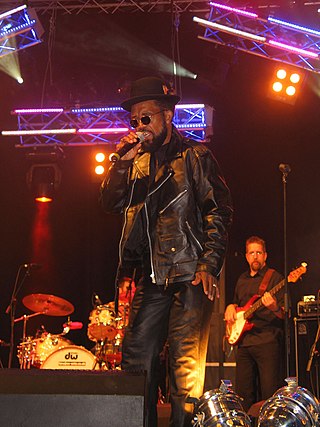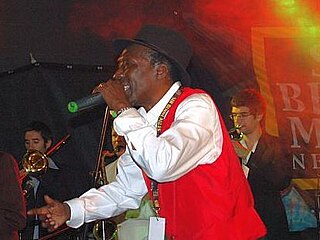
Reggae is a music genre that originated in Jamaica in the late 1960s. The term also denotes the modern popular music of Jamaica and its diaspora. A 1968 single by Toots and the Maytals, "Do the Reggay", was the first popular song to use the word reggae, effectively naming the genre and introducing it to a global audience. While sometimes used in a broad sense to refer to most types of popular Jamaican dance music, the term reggae more properly denotes a particular music style that was strongly influenced by traditional mento as well as by American jazz and rhythm and blues, and evolved out of the earlier genres ska and rocksteady. Reggae usually relates news, social gossip, and political commentary. It is instantly recognizable from the counterpoint between the bass and drum downbeat and the offbeat rhythm section. The immediate origins of reggae were in ska and rocksteady; from the latter, reggae took over the use of the bass as a percussion instrument.

Ska is a music genre that originated in Jamaica in the late 1950s and was the precursor to rocksteady and reggae. It combined elements of Caribbean mento and calypso with American jazz and rhythm and blues. Ska is characterized by a walking bass line accented with rhythms on the off beat. It was developed in Jamaica in the 1960s when Stranger Cole, Prince Buster, Clement "Coxsone" Dodd, and Duke Reid formed sound systems to play American rhythm and blues and then began recording their own songs. In the early 1960s, ska was the dominant music genre of Jamaica and was popular with British mods and with many skinheads.
The music of Jamaica includes Jamaican folk music and many popular genres, such as mento, ska, rocksteady, reggae, dub music, dancehall, reggae fusion and related styles.

Clement Seymour "Coxsone" Dodd was a Jamaican record producer who was influential in the development of ska and reggae in the 1950s, 1960s and beyond.
Rocksteady is a music genre that originated in Jamaica around 1966. A successor of ska and a precursor to reggae, rocksteady was the dominant style of music in Jamaica for nearly two years, performed by many of the artists who helped establish reggae, including harmony groups such as the Techniques, the Paragons, the Heptones and the Gaylads; soulful singers such as Alton Ellis, Delroy Wilson, Bob Andy, Ken Boothe and Phyllis Dillon; musicians such as Jackie Mittoo, Lynn Taitt and Tommy McCook. The term rocksteady comes from a popular (slower) dance style mentioned in the Alton Ellis song "Rocksteady", that matched the new sound. Some rocksteady songs became hits outside Jamaica, as with ska, helping to secure the international base reggae music has today.

Cecil Bustamente Campbell, known professionally as Prince Buster, was a Jamaican singer-songwriter and producer. The records he released in the 1960s influenced and shaped the course of Jamaican contemporary music and created a legacy of work that would be drawn upon later by reggae and ska artists.

Alton Nehemiah Ellis was a Jamaican singer-songwriter. One of the innovators of rocksteady, he was given the informal title "Godfather of Rocksteady". In 2006, he was inducted into the International Reggae And World Music Awards Hall Of Fame.
Studio One is one of Jamaica's most renowned record labels and recording studios; it has been described as the Motown of Jamaica. The record label was involved with most of the major music movements in Jamaica during the 1960s and 1970s, including ska, rocksteady, reggae, dub and dancehall.
Delroy George Wilson CD was a Jamaican ska, rocksteady and reggae singer. Wilson is often regarded as Jamaica's first child star, having first found success as a teenager. His youngest son, Karl "Konan" Wilson, has found success as part of British duo Krept and Konan.
In Jamaican popular culture, a sound system is a group of disc jockeys, engineers and MCs playing ska, rocksteady or reggae music. The sound system is an important part of Jamaican culture and history.
Clancy Eccles was a Jamaican ska and reggae singer, songwriter, arranger, promoter, record producer and talent scout. Known mostly for his early reggae works, he brought a political dimension to this music. His house band was known as The Dynamites.
Winston Sparkes, better known as King Stitt, was a Jamaican pioneer DJ.
The Skatalites are a ska band from Jamaica. They played initially between 1963 and 1965, and recorded many of their best known songs in the period, including "Guns of Navarone." They also played on records by Prince Buster and backed many other Jamaican artists who recorded during that period, including Bob Marley & The Wailers, on their first single "Simmer Down." They reformed in 1983 and have played together ever since.
Theophilus Beckford was a Jamaican pianist and one of the pioneers of Jamaican popular music during the transition from rhythm 'n' blues to Jamaican ska.
Lloyd Coxsone is a Jamaican-born sound system operator and record producer, who has been resident in the United Kingdom since 1962.
Aubrey Wellington Adams was a Jamaican pianist and keyboard player who was one of the top bandleaders in Jamaica in the 1950s, and led the Dewdroppers as well as playing with Clue J & His Blues Blasters.
Winston Cooper, better known as Count Matchuki or Count Machuki, was a Jamaican deejay.
Tom the Great Sebastian was an early Jamaican sound system started by Tom Wong in 1950, named for a trapeze performer in Barnum and Bailey's circus. The group has been called "the all-time giant of sound systems" and helped launch several notable artists. Count Matchuki is generally credited as Tom's first deejay, before he joined Coxsone Dodd, and Duke Vin was one of Tom's selectors. The sound was also backed by Prince Buster. It was later known as Metromedia.
Doris Albertha Darlington was a Jamaican Maroon who owned a food shop and later a liquor store in Kingston, Jamaica, in the 1950s and 1960s. This site provided the initial space for her son Coxsone Dodd to begin playing music for customers, a practice that eventually led to his founding Studio One and becoming one of the island's key musical forces. When her son was away buying records to play on the sound system, Darlington set up and ran the sound system herself, and thus can be named one of Jamaica's first sound system operators, and a force in the development of ska, rocksteady and reggae music. Darlington also ran a record store in Jamaica, was often present at Studio One recording studios and involved in producing music in the early 1960s.

Winston Foster, better known by the stage name Yellowman and also known as King Yellowman, is a Jamaican reggae and dancehall deejay. He first became popular in Jamaica in the 1980s, rising to prominence with a series of singles that established his reputation.





